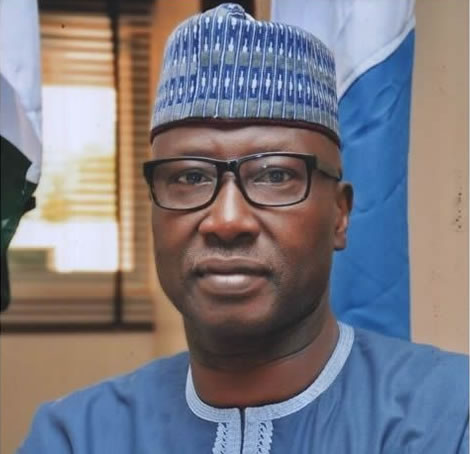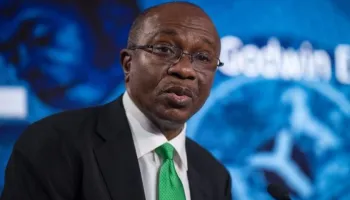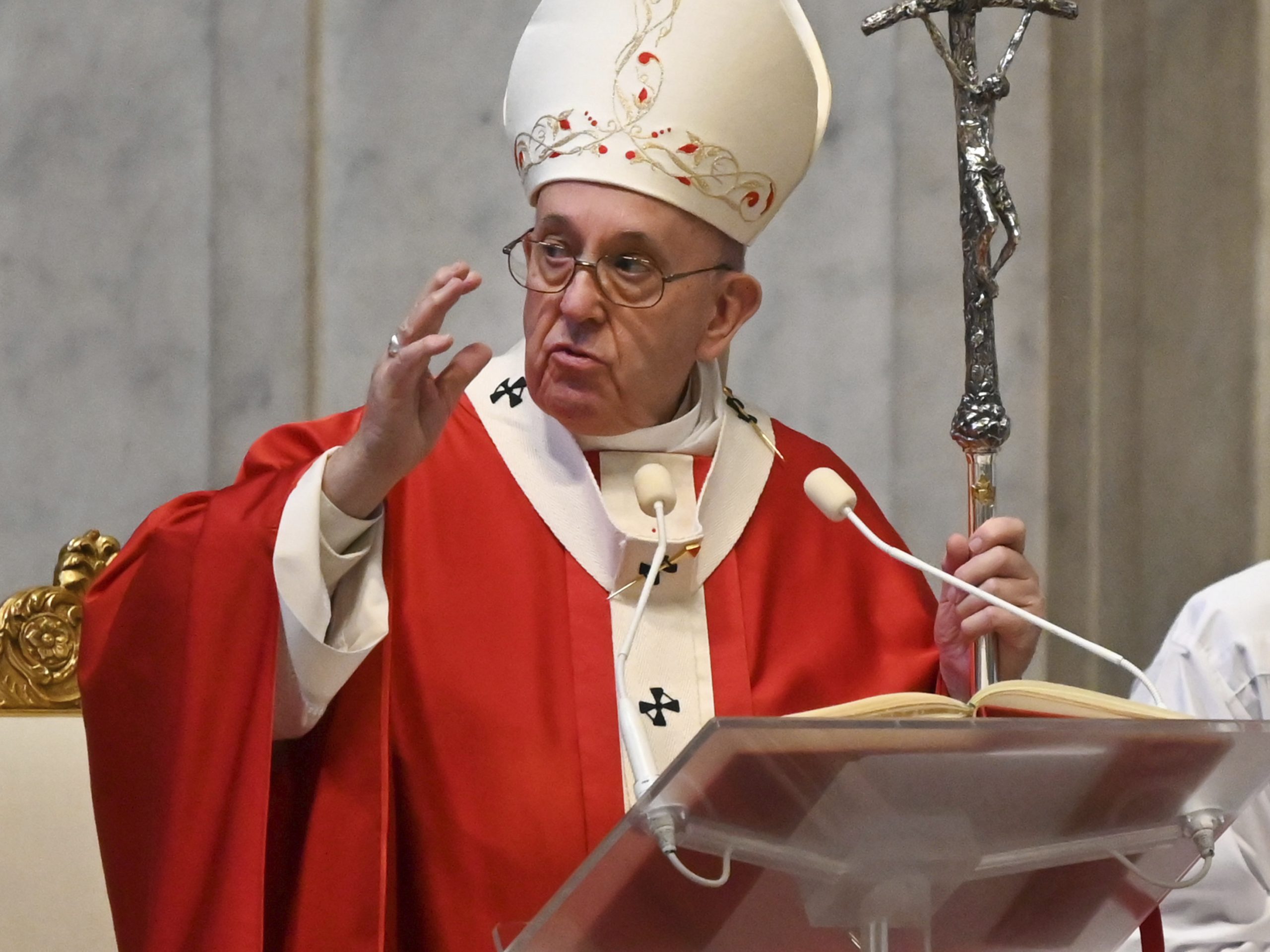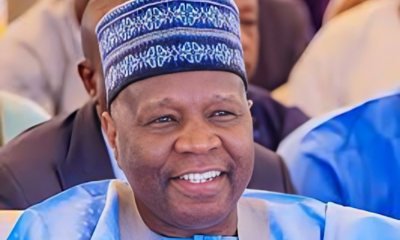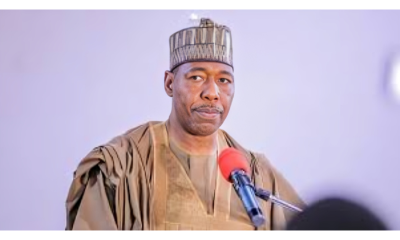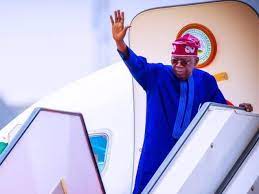COVER
I Won’t Pick My Successor in 2023 – Buhari
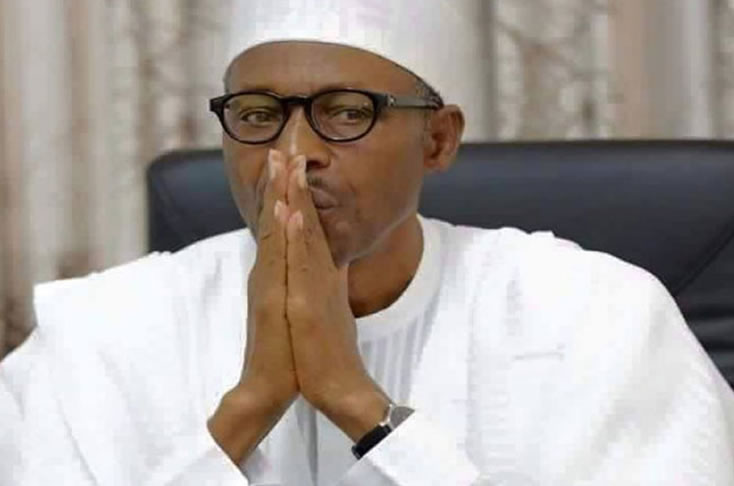
* Says Abiola as President would have ended ethno-religious crisis
By Mathew Dadiya, Abuja
President Muhammadu Buhari on Tuesday said identifying somebody as the next person to succeed him in 2023 as president will create problems for him.
The President also warned that nobody should think he can just become a President by just talking but he worked hard and contested for elections severally before he succeeded.
He spoke while receiving the members of the Progressive in Academics (Pro-Acad) at the Presidential Villa, Abuja.
However, President Buhari said he would rather stay away from identifying anybody as his successor so as not to create problem for such a person.
The president said: “To me this is very funny. I think if I identify anybody, I’d create more problem for him or for her.
“So, I’d rather keep my mouth shut. Let those who would want to be president try as much as I did. And I believe that those who are interested know that I tried three times.
“And the first time, I thank God and technology, PVC. Before, they just go to the television and they read the results. They say anybody who disagreed should go to court.
“And most of my supporters are looking for next day’s meal. They don’t have money to give to lawyers. So, I said God dey. So, the first time God and technology came along, PVC they couldn’t rig the election so I won.
The president, therefore, challenged the youths to continue to work harder, saying that they should not take things for granted.
“I tried to work hard but I think you have a lot more to do you as intellectuals so that you correctly document Nigeria’s political development. It’s very important for the next generation.
“A lot of our young chaps are taking things for granted. Imagine to contest election three times ending up in Supreme Court three times. It needs a lot of conviction you know, and hard work.
“But people take success for granted. They say, ah, he’s the president. They think it’s just closed my eyes and I got it? The president asked rhetorically, he added.
The Members of the progressives in Academics, who were drawn from different tertiary institutions across the country, presented three proposals on revitalization of education, power and agriculture to the president possible approval.
The group had asked him to start grooming a youth who will replace him when his second term tenure expires in 2023.
The President also blamed state governments for the state of the Almajiri system in the country.
Meanwhile, President Buhari has described the late MKO Abiola as a bridge builder who could have prevented the religious and tribal issues besetting the country now from happening, if he had been allowed to rule Nigeria.
Speaking Tuesday, in Abuja, when he received Elders and Leaders of Thought from Ogun State at the State House, President Buhari said:
“If MKO Abiola was allowed to rule, the religious and tribal issues now in Nigeria would not have been as strong, because he ran on a Muslim-Muslim ticket, chose his deputy from the Kanuri, a minority tribe and because of his personality, he went across Nigeria and was accepted.
“He used his resources and energy to convince Nigerians that all he wanted was a solid Nigeria and nothing else.”
President Buhari also said that he named the National Stadium, a national monument after the late politician because he knows that the youths would want to find out why such an important national institution was named after MKO Abiola in future.
He expressed appreciation to Governor Dapo Abiodun for mobilising such a strong delegation to thank him for the gesture towards their illustrious son.
The Ogun State delegation, led by the governor, had come to thank the President for the honour done the late MKO Abiola, an indigene of the State, by conferring on him the highest national honour, Grand Commander of the Federal Republic (GCFR) for his ultimate sacrifice in enthroning democracy.
The delegation, which presented a big talking drum to the President, also used the opportunity to solicit for the rehabilitation of some federal roads as well as other critical infrastructure in the State, which they are convinced will decongest the gridlock occasioned by the movement of consignments along the Apapa – Oshodi expressway and improve the standard of living of Nigerians along the corridor.
COVER
Seven Months After, Reps Pass Harmonized Tax Reform Bills

By Eze Okechukwu and Ubong Ukpong,Abuja
House of Representatives on Wednesday passed the tax reform bills transmitted to the National Assembly by President Bola Tinubu in October 2024.The bills were passed at a session presided over by the Deputy Speaker, Benjamin Kalu.
The development followed the adoption of the harmonised versions of the reform bills by both the House and the Senate. At plenary on Wednesday, the House of Representatives considered the report of the conference committee, which harmonised the bills. The Chairman of the House Committee on Finance, Abiodun Faleke (APC, Lagos), who headed the House team to the conference committee, presented the conference report to the House for consideration.According to him, the Conference Committee met and agreed on all areas of difference in the version passed by both chambers of the National Assembly. He stated that there were 45 areas of difference in the Nigeria Tax Administration Bill, 12 areas of difference in the Nigeria Revenue Service Bill, 9 areas of difference in the Joint Revenue Board Bill and 46 areas of difference in the Nigeria Tax Bill, adding that all grey areas were resolved ahead of the passage. While the conference committee agreed to retain the Senate version in some of the clauses, they also retained the House version in some others, making amendments in a few others. The conference committee agreed to the imposition of a 4 per cent development levy on the assessable profit of all companies chargeable to tax under Chapters 2 and 3, except small companies and non-resident companies. They also agreed that the levy shall be collected by the Nigeria Revenue Service and paid into a special account created for the same purpose.In the sharing formula, the committee agreed that 50 per cent of the tax would go to the Tertiary Education Trust Fund, 15 per cent to the Education Loan Fund (up from 3 per cent agreed by the House), and 8 per cent to the Nigeria Information Technology Development Fund.
Similarly, the National Agency for Science and Engineering Infrastructure is to get 8 per cent (down from 10 per cent earlier agreed by both chambers), the National Board for Technology Incubation is to get 4 per cent from the fund, defence and security infrastructure is to get 10 per cent while cyber security fund will get 5 per cent.
Meanwhile, the Social Security Fund, Nigeria Police Trust Fund, and National Sports Development Fund were excluded from the list of beneficiaries passed by the House of Representatives.
The committee also adopted a new clause 158, which imposes a 5 per cent surcharge on chargeable fossil fuel products provided or produced in Nigeria and shall be collected at the time a chargeable transaction occurs.
The controversial Value Added Tax sharing formula was not part of the areas of disagreement between the two legislative chambers.
In his remarks, Kalu said the parliament has played its part in ensuring that the country moves forward, even as he urged the executive arm of government to do its part.
In his contribution, a member of the House representing Gwoza/Damboa/Chibok Federal Constituency, Borno State, Ahmed Jaha warned those who will clean up the bill not to tamper with any of the clauses passed, saying “Where the T is not crossed, don’t cross it, where the I is not dotted, don’t do it. We have the original copies of the bills as passed before and after harmonisation.
“We have had cases in the past where those in charge of cleaning up the bills tamper with it and at the end of the day, the President will withhold assent. That must not happen.”
That said, the All Progressives Congress lawmaker singled out Speaker Tajudeen Abbas and Deputy Speaker, Benjamin Kalu for praise, saying, “I want to thank your leadership for the role you played in making these bills a success. I also want to thank the Chairman of the Committee, Abiodun Faleke. He showed that he is truly a good elder. He provided a lot of training for some of us, and I want to say that this is the way to go.”
In a related development, the Senate has approved the Rivers State 2025 budget for a second reading.
The budget, which totals ₦1,480,662,592,442 trillion, was presented by the Senate Leader, Senator Michael Opeyemi Bamidele, on Wednesday.
Bamidele explained that the Senate had assumed legislative powers over Rivers State following the declaration of a State of Emergency in the state.
Supporting the motion, Senator Solomon Adeola Olamilekan emphasised the urgency of passing the budget to ensure that the people of Rivers State feel the impact of governance.
He said, “Mr. President, I am not exactly sure under what title this document is categorised, but from what I can see, it pertains to a budget under the state of emergency. I hereby support its passage for second reading so that the people of Rivers can feel the presence of government.”
With no opposition to the motion, the Senate President, Godswill Akpabio, conducted a voice vote and referred the budget to the Ad-hoc Committee on Overseeing the Rivers State of Emergency for further legislative action.
Senate announced that the Sole Administrator of Rivers State, Vice Admiral Ibok-Ete Ekwe Ibas, along with other key state officials, would appear before a Joint National Assembly Ad-hoc Committee to defend the state’s 2025 budget. NASS holds commemorate 25 years of democracy, holds joint session,
Also,President of the Senate, Senator Godswill Akpabio, has announced that a joint session of the National Assembly will be held on June 12 to commemorate Democracy Day.
He made the announcement after the upper chamber reconvened for plenary on Wednesday.
Akpabio revealed that the Senate leader, Senator Opeyemi Bamidele, the Senate minority leader, Senator Abba Moro as well as the Chairman senate services, Senator Sunday Karimi will meet with their counterparts in the House of Representatives to finalize the programme of activities and coordinate arrangements for the special session.
COVER
Dangote Beats MTN, DSTV, AZAM to Emerge as Most Admired African Brand

By David Torough, Abuja
It was another historic milestone for pan-African investor Aliko Dangote and the Dangote Industries Limited over the weekend, as they garnered three prestigious accolades at the 15th annual Brand Africa 100 awards, held at the iconic Africa Hall in Addis Ababa, Ethiopia—the birthplace of the Organisation of African Unity (OAU), now the African Union (AU).
Dangote Industries Limited was named Most Admired African Brand, following an independent, consumer-led survey conducted across more than 30 African countries. The company was also inducted into the Brand Africa Hall of Fame, becoming the first African firm to receive this distinction. The induction recognises Dangote’s transformative impact on African consumers and its influential role in shaping a positive narrative for the continent.President/Chief Executive, Dangote Industries Limited, Aliko Dangote was honoured with a Lifetime Achievement Award in recognition of his leadership in driving impactful industrialisation, establishing a world-class African brand and reshaping the continent’s economic future through a benchmark, homegrown enterprise.Joining Dangote Industries in the inaugural Hall of Fame were MTN, M-Pesa, Ethiopian Airlines, and South Africa, for consistently ranking among Africa’s most admired brands over the past 5 to 15 years and for building sustainable, globally respected brands.Reacting to the awards, Group Chief Branding & Communications Officer, Dangote Industries Limited, Anthony Chiejina, said the honours reflect the unwavering commitment, excellence, and innovation that define the group’s journey. He added that they are a testament to the dedication of the company’s outstanding team, partners, and stakeholders, who continue to believe in the mission to drive sustainable development and economic growth across the continent.”We also extend our heartfelt appreciation for the Lifetime Achievement Award presented to our Founder and President, Aliko Dangote for building a purposeful world-class industrial brand that has exceptionally transformed African lives and the African narrative. This accolade celebrates not only his visionary leadership but also his tireless efforts in transforming industries, creating opportunities, and championing African enterprise on the global stage. His legacy is an inspiration to generations of entrepreneurs and leaders across Africa,” he said.Noting that the recognition would further inspire the company to push boundaries, empower communities, and deliver meaningful value across Africa and beyond, Chiejina reaffirmed Dangote Industries’ commitment to excellence, integrity, and transformative growth.In his keynote address, United Nations Under-Secretary-General and Executive Secretary of the Economic Commission for Africa, Mr Claver Gatete, praised Aliko Dangote, the Hall of Fame inductees, and the Brand Africa laureates for advancing the African agenda.He highlighted the alignment between Brand Africa and the ECA’s mission to promote inclusive industrialisation, regional integration, and private sector-led growth. He also called for increased investment in youth-led innovation, regional value chains and the establishment of a Pan-African Creative Innovation Fund to identify, finance and globalise Africa’s most promising brands.”I wish to particularly acknowledge MTN, Dangote Group, mPesa and Ethiopian Airlines for consistently maintaining their distinguished positions among the “Most Admired African Brands” category and continuing to set benchmarks in brand leadership, innovation and continental impact,” he said.COVER
Land Revocation: FCTA Seals PDP Secretariat, FIRS, Access Bank, Others
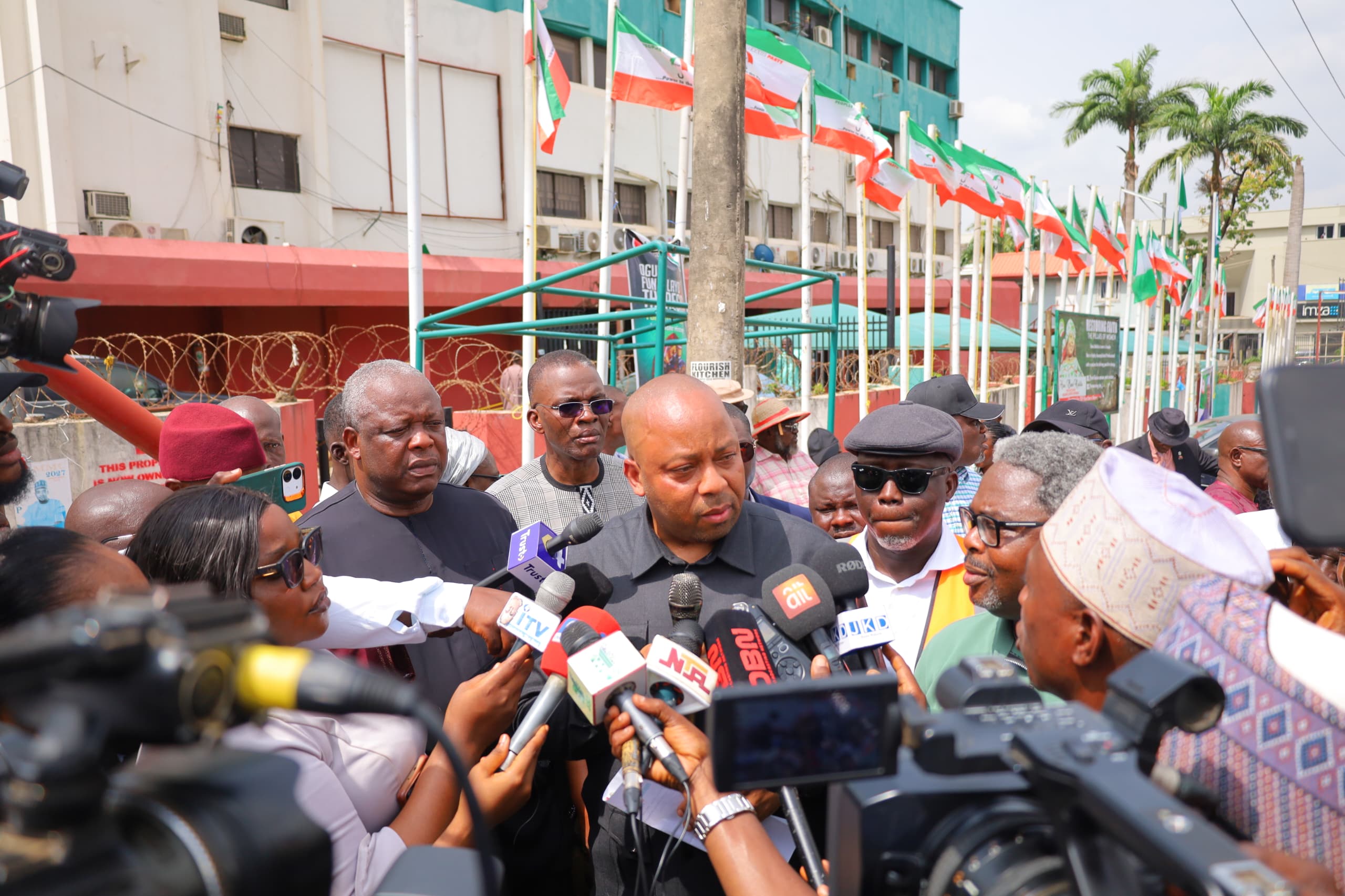
By Johnson Eyiangho and Laide Akinboade Anima, Abuja
A team from the Federal Capital Territory Administration (FCTA) on Monday sealed the Peoples Democratic Party (PDP) national secretariat, Wuse Zone 5, Abuja.The sealing of the PDP secretariat came barely 24 hours to the much anticipated meeting of the party’s National Executive Committee (NEC) scheduled for Tuesday.
The national secretariat also serves as the venue to the PDP NEC meeting. A joint taskforce comprising officials from the FCTA, Police, DSS, Army, NDLEA and NSCDC stormed the Secretariat at about 2.04pm and sealed the office shortly after a crucial meeting of the PDP National Working Committee (NWC).However, after a briefing meeting between the FCTA and PDP officials, all cars parked in the premises of the Secretariat were allowed to move out, while the PDP’s officials rushed to Bauchi State Governor’s Lodge for the Caucus meeting of the party.The sealing of the Secretariat is widely perceived as a strategic escalation in Wike’s ongoing feud with leadership of the party, particularly those pushing for the removal of his lackey, Senator Samuel Nnaemeka Anyanwu, as National Secretary of the party.Meanwhile, the National Working Committee (NWC) of the PDP has vowed that the National Executive Committee (NEC) meeting slated for Tuesday May 27, 2025 will be held as scheduled.A party official who did not want to be named described the sealing of the Secretariat as a temporary setback, vowing that all party activities leading to NEC and beyond will continue.The National Caucus Meeting, Board of Trustees and Governors meetings are part of activities ahead of the NEC meeting.The FCT Minister had revoked over 4,700 properties due to long-standing non-payment of ground rent to the Federal Capital Territory Administration (FCTA).Also affected by the Monday exercise are Access Bank, the Federal Inland Revenue Service (FIRS), Ibro Hotel and Total Energy in Abuja.The enforcement, which began in the Wuse District, was led by FCT Minister’s Senior Special Assistant on Public Communications and Social Media, Lere Olayinka, Director of Land Administration, Chijioke Nwankwoeze and Director Department of Development Control, Mukhtar Galadima.Speaking during the sealing of Plot 534, Cadastral Zone A02, Wuse Zone 1, belonging to Total PLC, Galadima said, “Today is about walking the talk. We announced this earlier, and we are here to implement what we said to take possession of all revoked properties, starting with this plot.”He noted that the Total PLC property had accumulated over 10 years of unpaid ground rent, leading to its revocation in March 2025.Also sealed was the Access Bank branch located on Plot 2456, Wuse 1, Cadastral Zone A02. The property, however, belongs to Rana Taher Furniture Nigeria Limited and was revoked due to 34 years of unpaid ground rent.Galadima said the enforcement would proceed to other parts of the city, including the Central Area, after the Wuse district.Tinubu Intervenes, Gives 14-days GracePresident Bola Tinubu has intervened on the ongoing enforcement of possession of 4,794 properties revoked for non-payment of ground rent from 10 to 43 years and has given them 14 days ultimatum to pay up.This was revealed at a briefing by the Director of Land Administration, Chijioke Nwankwoeze, in Abuja.He said the defaulters have been given 14 days to pay up all outstanding and the penalty fees.The Director of Land noted that even though properties owned by government institutions, corporate organisations and individuals were affected, the Administration is committed to carrying out its functions without fear or favour.He said, “However, the President, His Excellency Bola Ahmed Tinubu, GCFR, has intervened. Therefore, by Mr. President’s intervention, holders of the affected properties now have 14 days (TWO WEEKS) to settle the outstanding Ground Rents, with associated penalties.”For properties in the Central Area, the sum of N5 million will be paid by the defaulters as penalty, in addition to the Ground Rent owed.”Those in Maitama, Asokoro, Wuse II, and Guzape Districts will pay the sum of N3 million as penalty, in addition to the Ground Rent owed.”Defaulters in Wuse I, Garki I and Garki II will pay N2 million as penalty in addition to the Ground Rent owed”.He added, “Also, all those who purchased properties from other people, but are yet to register their interests by obtaining the mandatory Minister’s Consent and registering their Deeds of Assignment now have 14 days (TWO WEEKS) to do so at the FCT Department of Land Administration.”Furthermore, the Minister of the Federal Capital Territory (FCT), Barrister Nyesom Ezenwo Wike, CON, has granted a 14 days (TWO WEEKS) grace period to all property holders in the FCT to pay up their Right of Occupancy (R-of-O)/Certificate of Occupancy (C-of-O) bills, or risk revocation of those titles”.The FCT Minister therefore urged property owners in the FCT to ensure that they pay all necessary bills and charges on their properties as at and when due, so as to enable the government to continue to carry out necessary developmental projects for the benefit of the people.
